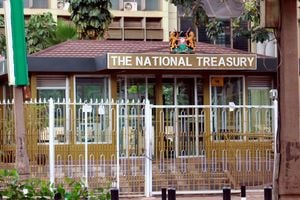
Cabinet Secretary for National Treasury and Economic Planning Prof Njuguna Ndung'u.
Kenya is now seeking the assistance of the US government to navigate through its cash crisis by accessing cheap loans from the global financial markets.
Nairobi is seeking a sovereign loan guarantee from Washington that would provide Kenya with access to financing from international capital markets at significantly lower rates.
In February, Kenya sold a new $1.5 billion Eurobond at great cost to fund the buyback of a large portion of the $2 billion bond, which is maturing in June 2024.
However, the double-digit yield of 10.4 percent that Kenya was forced to pay on the $1.5 billion bond was seen as an indication that it is still seen as risky by investors. That was well above the 6.875 percent that the 2024 bond had offered.
The pressure on the Kenyan government’s finances has forced it to try to squeeze every shilling it can from taxpayers, angering voters who had supported the current government on the premise it would lower the cost of living.
Kenya is eyeing the US sovereign loan guarantee to help it raise debt, which will be used for budget support and repayment of public loans, at lower single-digit rates.
This emerged in a meeting between the Treasury Cabinet Secretary Njuguna Ndung’u and his US counterpart Janet Yellen on the sidelines of the ongoing IMF/World Bank Spring Meetings.
Prof Ndung'u told Ms Janet that Kenya was still reeling from several shocks that pushed the country into a liquidity crunch amid the recovery of the economy, citing 5.5 percent economic growth in 2023 and fall in inflation.
“The CS [for Treasury] noted that the persistent shocks exerted fiscal pressure, leading to the deterioration of the country’s debt sustainability. It means that the ongoing unexpected events are straining the government’s finances and debt management efforts,” reads a statement from the National Treasury.
“He sought US support in liability management operations by way of a US Government sovereign guarantee or through the Development Finance Corporation (DFC),” added the statement.
Under the loan guarantee, the United States government takes on the entire risk associated with a private bank loan to a sovereign country or support for issuance of foreign government bonds like the Eurobond.
The DFC often provides credit to private sector firms, targeting sectors such as health, energy, agriculture and infrastructure.
Following legal changes by the Donald Trump administration sovereign loan guarantees are run by the DFC, the US development finance institution.
Since 2004, DFC has committed $1.065 billion (Sh142.7 billion) in the form of loans, technical assistance, and direct equity investment to 40 projects since 2004.
Kenya could tap the guarantees to de-risk the country when borrowing from private creditors.
While interest rates have shot up everywhere over the last couple of years, a double-digit borrowing cost remains one of the most obvious warning signs that not all is well in a country.
A borrowing-fuelled infrastructure drive is partly why Kenya’s debt-to-GDP ratio now tops 70 percent.
Credit ratings agency Fitch estimates it will spend almost a third of its government revenues just on interest payments this year.
Chinese loans
Kenya, which still needs to sort the remaining $500 million of the maturing Eurobond and some Chinese loans maturing in July, would like the US to help it reduce the cost of borrowing from the international capital market to repay some of these debts.
For the US, SLGs are foreign policy instruments to keep its financially distressed allies in developing countries from falling into the arms of China, which has forked out billions of loans to African countries to build roads, ports, railways, and dams.
China, which remains Africa’s largest bilateral lender, has however reduced its financial outlay to African countries due to increasing risk of default.
By the end of December last year, US debt to Kenya stood at $7.43 million (Sh978 million), less than one percent of China’s $6 billion (Sh788 billion). However, US private investors, including pension funds and hedge funds, are the biggest players in the Eurobond market where Kenya has been an active borrower.
After a period of tight liquidity occasioned by the raising of interest rates by the Central Banks in rich countries that saw most of the African countries stay out of the global financial markets for over two years, Ivory Coast, Benin, and Kenya issued sovereign bonds again.
But even for countries that have re-accessed international markets, borrowing costs remain high, said the International Monetary Fund (IMF) in its latest Regional Economic Outlook for Sub-Saharan Africa.
The IMF noted that as of end-March, the average yield (rate of return) on the region’s Eurobonds for non-distressed countries was close to 11 percent, significantly higher than the pre-pandemic average of 7.3 percent, making it still unaffordable for many, added the fund.
“Kenya, for instance, issued a bond at 10.4 percent yield to maturity, significantly above the 6.9 percent yield at issuance of its bond due this year. This allowed the country to clear most of its immediate debt and push back repayments by seven years,” said the IMF.
“Similarly, Côte d’Ivoire faced its highest borrowing cost in a decade with a USD-denominated Eurobond.”
Although the difference in yields between bonds issued by the American government and by African ones—an indication of the risk premium that investors demand or the ‘African premium’ —has been shrinking, the global financial markets are still tight for most African countries.
To avert default, the government of President William Ruto has made far-reaching changes to its tax code which the head of state has described as “painful” but necessary.
Inflation has also eased to within the Central Bank target of between 2.5 and 7.5 percent.







